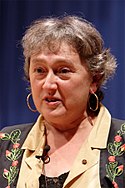Lynn Margulis Quote
Natural selection eliminates and maybe maintains, but it doesn't create... Neo-Darwinists say that new species emerge when mutations occur and modify an organism. I was taught over and over again that the accumulation of random mutations led to evolutionary change [which] led to new species. I believed it until I looked for evidence.
Lynn Margulis
Natural selection eliminates and maybe maintains, but it doesn't create... Neo-Darwinists say that new species emerge when mutations occur and modify an organism. I was taught over and over again that the accumulation of random mutations led to evolutionary change [which] led to new species. I believed it until I looked for evidence.
Related Quotes
[:]Atheism by itself is, of course, not a moral position or a political one of any kind; it simply is the refusal to believe in a supernatural dimension. For you to say of Nazism that it was the imple...
Christopher Hitchens
Tags:
albert einstein, barbaric, catholicism, charles darwin, darwin, darwinism, einstein, evolution, fascism, fascistic
I would remind you to notice where the claim of consensus is invoked. Consensus is invoked only in situations where the science is not solid enough. Nobody says the consensus of scientists agrees that...
Michael Crichton
Tags:
9 11, bisphenol a, bpa, consensus, darwinism, evolution, excitotoxins, fluoride, global warming, id
To establish evolutionary interrelatedness invariably requires exhibiting similarities between organisms. Within Darwinism, there's only one way to connect such similarities, and that's through descen...
William A. Dembski
Tags:
biology, conclusions, darwinism, evidence, evolution, homology, id, ignorance, intelligent design, interpretation
About Lynn Margulis
Lynn Margulis (born Lynn Petra Alexander; March 5, 1938 – November 22, 2011) was an American evolutionary biologist, and was the primary modern proponent for the significance of symbiosis in evolution. In particular, Margulis transformed and fundamentally framed current understanding of the evolution of cells with nuclei by proposing it to have been the result of symbiotic mergers of bacteria. Margulis was also the co-developer of the Gaia hypothesis with the British chemist James Lovelock, proposing that the Earth functions as a single self-regulating system, and was the principal defender and promulgator of the five kingdom classification of Robert Whittaker.
Throughout her career, Margulis' work could arouse intense objections, and her formative paper, "On the Origin of Mitosing Cells", appeared in 1967 after being rejected by about fifteen journals. Still a junior faculty member at Boston University at the time, her theory that cell organelles such as mitochondria and chloroplasts were once independent bacteria was largely ignored for another decade, becoming widely accepted only after it was powerfully substantiated through genetic evidence. Margulis was elected a member of the US National Academy of Sciences in 1983. President Bill Clinton presented her the National Medal of Science in 1999. The Linnean Society of London awarded her the Darwin-Wallace Medal in 2008.
Margulis was a strong critic of neo-Darwinism. Her position sparked lifelong debate with leading neo-Darwinian biologists, including Richard Dawkins, George C. Williams, and John Maynard Smith.: 30, 67, 74–78, 88–92 Margulis' work on symbiosis and her endosymbiotic theory had important predecessors, going back to the mid-19th century – notably Andreas Franz Wilhelm Schimper, Konstantin Mereschkowski, Boris Kozo-Polyansky, and Ivan Wallin – and Margulis not only promoted greater recognition for their contributions, but personally oversaw the first English translation of Kozo-Polyansky's Symbiogenesis: A New Principle of Evolution, which appeared the year before her death. Many of her major works, particularly those intended for a general readership, were collaboratively written with her son Dorion Sagan.
In 2002, Discover magazine recognized Margulis as one of the 50 most important women in science.
Throughout her career, Margulis' work could arouse intense objections, and her formative paper, "On the Origin of Mitosing Cells", appeared in 1967 after being rejected by about fifteen journals. Still a junior faculty member at Boston University at the time, her theory that cell organelles such as mitochondria and chloroplasts were once independent bacteria was largely ignored for another decade, becoming widely accepted only after it was powerfully substantiated through genetic evidence. Margulis was elected a member of the US National Academy of Sciences in 1983. President Bill Clinton presented her the National Medal of Science in 1999. The Linnean Society of London awarded her the Darwin-Wallace Medal in 2008.
Margulis was a strong critic of neo-Darwinism. Her position sparked lifelong debate with leading neo-Darwinian biologists, including Richard Dawkins, George C. Williams, and John Maynard Smith.: 30, 67, 74–78, 88–92 Margulis' work on symbiosis and her endosymbiotic theory had important predecessors, going back to the mid-19th century – notably Andreas Franz Wilhelm Schimper, Konstantin Mereschkowski, Boris Kozo-Polyansky, and Ivan Wallin – and Margulis not only promoted greater recognition for their contributions, but personally oversaw the first English translation of Kozo-Polyansky's Symbiogenesis: A New Principle of Evolution, which appeared the year before her death. Many of her major works, particularly those intended for a general readership, were collaboratively written with her son Dorion Sagan.
In 2002, Discover magazine recognized Margulis as one of the 50 most important women in science.
